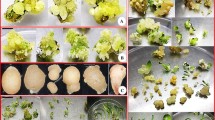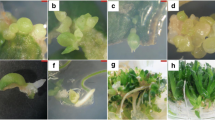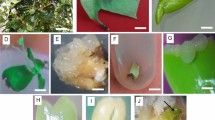Abstract
An efficient protocol is reported for in vitro plant regeneration through somatic embryogenesis in Piper aduncum, a Brazilian Amazon species with high economic potential. The species is important due to a variety of components found in its essential oil, with emphasis on dillapiole. Leaf explants from five accessions identified for high oil yield and levels of dillapiole were evaluated for their embryogenic potential. To induce embryogenic calli, the explants were cultivated in MS medium supplemented with 5 mg L−1 of 1-naphthaleneacetic acid (NAA) and 2.5 mg L−1 of N6-benzylaminopurine (BAP) for 80 d. For somatic embryogenesis, the embryogenic calli were transferred to MS medium with 10 mg L−1 of NAA and 2.5 mg L1 of BAP and incubated for 45 d. The obtained somatic embryos were germinated in MS medium without regulators by 45 d and the obtained plantlets were subjected to acclimatization. Somatic embryos and calli from this process were subjected to anatomical and histochemical analyses. Biochemical analyses (total soluble sugars, starch, total amino acids, and proteins) were also performed to identify markers for embryogenic competence acquisition. In addition, the germination of somatic embryos was evaluated in a semi-solid and liquid system (R.I.T.A.® temporary immersion bioreactors). The obtained plants were evaluated for genetic fidelity using ISSR markers. The present study indicate that the accessions did not differ in embryogenic potential, with a mean percentage of calli with somatic embryos of 82.4%. Anatomical analyses confirmed the occurrence of the embryogenic route and the histochemical analyses identified starch grains in somatic embryos at different developmental stages. The biochemical analyses showed high total soluble sugars and total amino acids in embryogenic calli, marks of the acquisition of the embryogenic competence of P. aducum. The R.I.T.A.® temporary immersion bioreactors were highly efficient in the regeneration of somatic plants, with 100% germination. The plants regenerated in the semi-solid and liquid systems showed high genetic homogeneity. The survival rate of the acclimatized plants was 100%.







Similar content being viewed by others
References
Abbasi BH, Ali H, Yücesan B, Saeed S, Rehman K, Khan MA (2016) Evaluation of biochemical markers during somatic embryogenesis in Silybum marianum L. 3 Biotech 71:1–8. https://doi.org/10.1007/s13205-016-0366-1
Aguilar-Hernández V, Loyola-Vargas VM (2018) Advanced proteomic approaches to elucidate somatic embryogenesis. Front Plant Sci 9(1658):1–17. https://doi.org/10.3389/fpls.2018.01658
Ahmad I, Hussain T, Ashraf I, Nafees M, Maryam Rafay M, Iqbal M (2013) Lethal effects of secondary metabolites on plant tissue culture. American-Eurasian J Agric Environ Sci 13(4):539–547. https://doi.org/10.5829/idosi.aejaes.2013.13.04.1975
Ali M, Mujib A, Zafar N, Tonk D (2018) Somatic embryogenesis, biochemical alterations and synthetic seed development in two varieties of coriander (Coriandum sativum L.). Adv Hortic Sci 32(2):239–248. https://doi.org/10.13128/ahs-22287
Almeida CA, Azevedo MMB, Chaves FCM, Oliveira MR, Rodrigues IA, Bizzo HR, Gama PE, Alviano DS, Alvian CS (2018) Piper essential oils inhibit Rhizopus oryzae growth, biofilm formation, and Rhizopuspepsin activity. Can J Infect Dis Med Microbiol 2018:1–7. https://doi.org/10.1155/2018/5295619
Al-Qurainy F, Nadeem M, Khan S, Alansi S, Tarroum M, Al-Ameri AA, Gaafar A-RZ, Alshameri A (2018) Rapid plant regeneration, validation of genetic integrity by ISSR markers and conservation of Reseda pentagyna an endemic plant growing in Saudi Arabia. Saudi J Biol Sci 25:111–116. https://doi.org/10.1016/j.sjbs.2017.07.003
Amaral LIV, Costa PMF, Aidar MPM, Gaspar M, Buckeridge MS (2007) Novo método enzimático rápido e sensível de extração e dosagem de amido em materiais vegetais. Hoehnea 34:425–431. https://doi.org/10.1590/S2236-89062007000400001
Américo FKA, Barbosa JCRCM, Curi CCS, Negreiros JRS, Carregaro JB (2011) Estudo de parâmetros para realização de teste de germinação de sementes em duas espécies do gênero Piper: Piper hispidinervum c.dc. e Piper aduncum. Ens Ciênc 15(2):33–45
Arroyo-Acevedo J, Chávez-Asmat RJ, Anampa-Guzmán A, Donaires R, Ráez-Gonzáles J (2015) Protective effect of Piper aduncum capsule on DMBA-induced breast cancer in rats. Breast Cancer: Basic Clin Res 9:41–48. https://doi.org/10.4137/BCBCR.S24420
Bakos F, Szabó L, Olmedilla A, Barnabás B (2009) Histological comparison between wheat embryos developing in vitro from isolated zygotes and those developing in vivo. Sex Plant Reprod 22:15–25. https://doi.org/10.1007/s00497-008-0087-7
Barciela J, Vieitez AM (1993) Anatomical sequence and morphometric analysis during somatic embryogenesis on cultured cotyledon explants of Camellia japonica L. Ann Bot 71(5):395–404. https://doi.org/10.1006/anbo.1993.1050
Bartos PMC, Gomes HT, Amaral LIV, Teixeira JB, Scherwinski-Pereira JE (2018) Biochemical events during somatic embryogenesis in Coffea arabica L. 3. Biotech 8(209). https://doi.org/10.1007/s13205-018-1238-7
Bhattacharyya P, Kumar V, Van Staden J (2017) Assessment of genetic stability amongst micropropagated Ansellia africana, a vulnerable medicinal orchid species of Africa using SCoT markers. S Afr J Bot 108:294–302. https://doi.org/10.1016/j.sajb.2016.11.007
Bradford MM (1976) A rapid sensitive method for quantitation of microgram quantities of protein utilizing the principle of protein-dye binding. Anal Biochem 72:248–254. https://doi.org/10.1016/0003-2697(76)90527-3
Bruijn JM, Bout M (2000) HPAEC analysis of aminoacids in sugarbeet samples: method development and application. Zuckerindustrie 125:604–609
Cangahuala-Inocente GC, Steiner N, Maldonado SB, Guerra MP (2009) Patterns of protein and carbohydrate accumulation during somatic embryogenesis of Acca sellowiana. Pesq Agropec Bras 44(3):217–224. https://doi.org/10.1590/S0100-204X2009000300001
Chuang SJ, Chen CL, Chen JJ, Chou WY, Sung JM (2009) Detection of somaclonal variation in micro-propagated Echinacea purpurea using AFLP marker. Sci Hortic 120:121–126. https://doi.org/10.1016/j.scienta.2008.09.020
Corredoira E, Cano V, Bárány I, Solís M-T, Rodríguez H, Vieitez A-M, Risueño MC, Testillano PS (2017) Initiation of leaf somatic embryogenesis involves high pectin esterification, auxin accumulation and DNA demethylation in Quercus alba. J Plant Physiol 213:42–54. https://doi.org/10.1016/j.jplph.2017.02.012
Doyle JJ, Doyle JL (1990) Isolation of plant DNA from fresh tissue. Focus 12:13–15
Dubois M, Gilles KA, Hamilton JK, Rebers PA, Smith F (1956) Colorimetric method for the determination of sugars and related substances. Anal Chem 28(3):350–356. https://doi.org/10.1021/ac60111a017
Ducos JP, Terrier B, Courtois D (2010) Disposable bioreactors for plant micropropagation and mass plant cell culture. Adv Biochem Engin/Biotechnol 115:89–115. https://doi.org/10.1007/10_2008_28
Etienne H, Berthouly M (2002) Temporary immersion systems in plant micropropagation. Plant Cell Tissue Organ Cult 69:215–231. https://doi.org/10.1023/A:1015668610465
Fehér A, Pasternak TP, Dudits D (2003) Transition of somatic plant cells to an embryogenic state. Plant Cell Tissue Organ Cult 74(3):201–228. https://doi.org/10.1023/A:1024033216561
Ferreira DF (2011) Sisvar: a computer statistical analysis system. Cienc Agrotecnol 35(6):1039–1042. https://doi.org/10.1590/S1413-70542011000600001
Ferreira GM, Mota MGC, Vieira IMS, Batista MSF, Silva SPG, Conceição CCC (2006) Propagação in vitro de Piper aduncum L. Rev de Cienc Agrar 45:235–242
Figueiredo RAO, Sazima M (2000) Pollination biology of Piperaceae species in southeastern Brazil. Ann Bot 85:455–460
Gaia JMD, Mota MGC, Conceição CCC, Maia JGS (2010) Collecting and evaluation of germplasm of spiked pepper from Brazilian Amazon. Hortic Bras 28(2):162–167. https://doi.org/10.1590/S0102-05362010000200004
Godbole S, Sood A, Sharma M, Nagar PK, Ahuja PS (2004) Starch deposition and amylase accumulation during somatic embryogenesis in bamboo (Dendrocalamus hamiltonii). J Plant Physiol 161:245–248. https://doi.org/10.1078/0176-1617-01219
Goebel-Tourand I, Mauro M-C, Sossountzov L, Miginiac E, Deioire A (1993) Arrest of somatic embryo development in grapevine: histological characterization and the effect of ABA, BAP and zeatin in stimulating plantlet development. Plant Cell Tissue Organ Cult 33:91–103
Gomes EN, Krinski D (2018) Rooting of apical, median and basal stem cuttings of Piper aduncum L. on different substrates. Revista de Ciências Agroveterinárias 17(3):435–439. https://doi.org/10.5965/223811711732018435
Gomes HT, Bartos PMC, Silva CO, Amaral LIV, Scherwinski-Pereira JE (2014) Comparative biochemical profiling during the stages of acquisition and development of somatic embryogenesis in African oil palm (Elaeis guineensis Jacq.). Plant Growth Regul 74:199–208. https://doi.org/10.1007/s10725-014-9901-4
Heikrujam M, Kumar D, Kumar S, Gupta SC, Agrawal V (2014) High efficiency cyclic production of secondary somatic embryos and ISSR based assessment of genetic fidelity among the emblings in Calliandra tweedii (Benth.). Sci Hortic 177:63–70. https://doi.org/10.1016/j.scienta.2014.07.036
Heringer AS, Santa-Catarina C, Silveira V (2018) Insights from proteomic studies into plant somatic embryogenesis. Proteomics 18(5–6):1–9. https://doi.org/10.1002/pmic.201700265
Jacinto ACP, Souza LP, Nakamura AT, Carvalho FJ, Simão E, Zocoler JL, Bergo CL (2018) Idioblasts formation and essential oil production in irrigated Piper aduncum. Pesq Agropec Trop 48(4):447–452. https://doi.org/10.1590/1983-40632018v4853165
Joseph B, Joseph D, Philip VJ (1996) Plant regeneration from somatic embryos in black pepper. Plant Cell Tissue Organ Cult 47:87–90. https://doi.org/10.1007/BF02318970
Krinski D, Foerster LA, Deschamps C (2018) Ovicidal effect of the essential oils from 18 Brazilian Piper species: controlling Anticarsia gemmatalis (Lepidoptera, Erebidae) at the initial stage of development. Acta Sci Agron 40(35273):1–10. https://doi.org/10.4025/actasciagron.v40i1.35273
Krishna H, Alizadeh M, Singh D, Singh U, Chauhan N, Eftekhari M, Sadh RK (2016) Somaclonal variations and their applications in horticultural crops improvement. 3. Biotech 6(54):1–18. https://doi.org/10.1007/s13205-016-0389-7
Kumar P, Gupta JK, Misra AK, Modi DR, Pandey BK (2009) Potential of molecular markers in plant biotechnology. J Plant Omics 2:141–162
Kumar SP, Kumari BDR (2011) Factors affecting on somatic embryogenesis of safflower (Carthamus tinctorius L) at morphological and biochemical levels. World J Agric Sci 7:197–205
Lai FM, Mckersie BD (1994) Regulation of starch and protein accumulation in alfalfa (Medicago sativa L.) somatic embryos. Plant Sci 100(2):211–219. https://doi.org/10.1016/0168-9452(94)90078-7
Larkin PJ, Scowcroft WR (1981) Somaclonal variation — a novel source of variability from cell cultures for plant improvement. Theoret Appl Genetics 60(4):197–214. https://doi.org/10.1007/BF02342540
Leclercq J, Martin F, Sanier C, Clément-Vidal A, Fabre D, Oliver G, Lardet L, Ayar A, Peyramard M, Montoro P (2012) Over-expression of a cytosolic isoform of the HbCuZnSOD gene in Hevea brasiliensis changes its response to a water deficit. Plant Mol Biol 80(3):255–272. https://doi.org/10.1007/s11103-012-9942-x
Lipavská H, Konrádová H (2004) Somatic embryogenesis in conifers: the role of carbohydrate metabolism. In Vitro Cell Dev Biol – Plant 40(1):23–30. https://doi.org/10.1079/IVP2003482
Litz RE, Conover RA (1982) In vitro somatic embryogenesis and plant regeneration from Carica papaya L. ovular callus. Plant Sci Lett 26:153–158
López CQ, Patricia CP, Lorrain-Lorrette B, Martinez-Swatson K, Michoux F, Simonsen HT (2018) Use of a temporary immersion bioreactor system for the sustainable production of thapsigargin in shoot cultures of Thapsia garganica. Plant Methods 14(79):1–17. https://doi.org/10.1186/s13007-018-0346-z
Maadon SN, Rohani ER, Ismail I, Baharum SN, Normah MN (2016) Somatic embryogenesis and metabolic differences between embryogenic and non-embryogenic structures in mangosteen. Plant Cell Tissue Organ Cult 127(2):443–459. https://doi.org/10.1007/s11240-016-1068-4
Mantiri FR, Kurdyukov S, Lohar DP, Sharopova N, Saeed NA, Wang X-D, VandenBosch KA, Rose RJ (2008) The transcription factor MtSERF1 of the ERF subfamily identified by transcriptional profiling is required for somatic embryogenesis induced by auxin plus cytokinin in Medicago truncatula. Plant Physiol 146:1622–1636. https://doi.org/10.1104/pp.107.110379
Martin AB, Cuadrado Y, Guerra H, Gallego P, Hita O, Martin L, Dorado A, Villalobos N (2000) Differences in the contents of total sugars, starch and sucrose in embryogenic and non-embryogenic calli from Medicago arborea L. Plant Sci 154:143–151. https://doi.org/10.1016/S0168-9452(99)00251-4
Martins JF, Santos T, Correia SI, Canhoto JM (2016) Somatic embryogenesis in Arbutus unedo L. and other Ericaceae. In: Park Y-S, Bonga JM, Moon H-K (eds) Vegetative propagation of Forest trees. National Institute of Forest Science (NiFos), Seoul, pp. 491–514
Murashige T, Skoog F (1962) A revised medium for rapid growth and bioassays with tobacco tissue cultures. Physiologia 15:473–497. https://doi.org/10.1111/j.1399-3054.1962.tb08052.x
Nair RR, Gupta S (2006) High frequency plant regeneration through cyclic secondary somatic embryogenesis in black pepper (Piper nigrum L). Plant Cell Rep 24:699–707. https://doi.org/10.1007/s00299-005-0016-2
Nascimento-Gavioli MCA, Cangahuala-Inocente GC, Steinmacher D, Ree JF, Steiner N, Guerra MP (2017) Physiological and biochemical features of embryogenic and non-embryogenic peach palm (Bactris gasipaes Kunth) cultures. In Vitro Cell Dev Biol – Plant 53(1):33–40. https://doi.org/10.1007/s11627-017-9805-x
Naseer S, Mahmood T (2014) Tissue culture and genetic analysis of somaclonal variations of Solanum melongena L. cv. Nirrala. Cent Eur J Biol 9(12):1182–1195. https://doi.org/10.2478/s11535-014-0354-6
Navarro BV, Elbl P, De Souza AP, Jardim V, De Oliveira LF, Macedo AF, Santos ALW, Buckeridge MS, Floh EIS (2017) Carbohydrate-mediated responses during zygotic and early somatic embryogenesis in the endangered conifer, Araucaria angustifolia. PLoS One 12(7):1–20. https://doi.org/10.1371/journal.pone.0180051
Naz R, Anis M, Alatar AA (2016) ISSR marker-based detection of genomic stability in Cassia occidentalis L. plantlets derived from somatic embryogenesis. Eng Life Sci 16:17–24. https://doi.org/10.1002/elsc.201500050
Nogueira JS, Gomes HT, Scherwinski-Pereira JE (2019) Micropropagation, plantlets production estimation and ISSR marker-based genetic fidelity analysis of Guadua magna and G. angustifolia. Pesq Agrop Trop 49:e53743. https://doi.org/10.1590/1983-40632019v4953743
O'Brien TP, Feder N, Mccylly ME (1964) Polychromatic staining of plant cell walls by toluidine blue O. Protoplasma 59:368–373. https://doi.org/10.1007/BF01248568
O'Brien TP, Mccylly ME (1981) The study of plant structure: principles and selected methods. Termarcarphi PTY. LTD, Melbourne
Padmanabhan K, Cantliffe DJ, Harrell RC, McConnell DB (1998) A comparison of shoot-forming and non-shoot-forming somatic embryos of sweet potato [Ipomoea batatas (L.) Lam.] using computer vision and histological analyses. Plant Cell Rep 17:685–692
Parmar VS, Jain SC, Bisht KS, Jain R, Taneja P, Jha A, Tyagi OM, Prasad AK, Wengel J, Olsen CE, Boll PM (1997) Phytochemistry of the genus Piper. Phytochemistry 46:597–673. https://doi.org/10.1016/S0031-9422(97)00328-2
Peredo EL, Revilla MA, García RA (2006) Assessment of genetic and epigenetic variation in hop plants regenerated from sequential subcultures of organogenic calli. J Plant Physiol 163(10):1071–1079. https://doi.org/10.1016/j.jplph.2005.09.010
Pinto G, Silva S, Neves L, Araújo C, Santos C (2010) Histocytological changes and reserve accumulation during somatic embryogenesis in Eucalyptus globulus. Trees 24:763–769. https://doi.org/10.1007/s00468-010-0446-5
Pullman GS, Skryabina A (2007) Liquid medium and liquid overlays improve embryogenic tissue initiation in conifers. Plant Cell Rep 26:873–887. https://doi.org/10.1007/s00299-006-0296-1
Radice M, Pietrantoni A, Guerrini A, Tacchini M, Sacchetti G, Chiurato M, Venturi G, Fortuna C (2018) Inhibitory effect of Ocotea quixos (lam.) Kosterm. and Piper aduncum L. essential oils from Ecuador on West Nile virus infection. Plant Biosyst. https://doi.org/10.1080/11263504.2018.1478902
Razaq R, Heikrujam M, Chetri SK, Agrawal V (2013) In vitro clonal propagation and genetic fidelity of the regenerants of Spilanthes calva DC. using RAPD and ISSR marker. Physiol Mol Biol Plants 19(2):251–260. https://doi.org/10.1007/s12298-012-0152-4
Ren X, Liu Y, Jeong BR (2020) Enhanced somatic embryo induction of a tree peony, Paeonia ostii ‘Fengdan’, by a combination of 6-benzylaminopurine (BA) and 1-naphthylacetic acid (NAA). Plants 9(3):1–12. https://doi.org/10.3390/plants9010003
Sales EK, Butardo NG (2014) Molecular analysis of somaclonal variation in tissue culture derived bananas using MSAP and SSR markers. Int J Biol Vet Agric Food Eng 8(6):63–610
Sandal I, Bhattacharya A, Ahuja PS (2001) An efficient liquid culture system for tea shoot proliferation. Plant Cell Tissue Organ Cult 65:75–80. https://doi.org/10.1023/A:1010662306067
Santana HT, Trindade FTT, Stabeli RG, Silva AAE, Militão JSTL, Facundo VA (2015) Essential oils of leaves of Piper species display larvicidal activity against the dengue vector, Aedes aegypti (Diptera: Culicidae). Rev Bras Plantas Med 17:105–111. https://doi.org/10.1590/1983-084X/13_052
Sasi S, Bhat A (2016) Optimization of cyclic somatic embryogenesis and assessing genetic fidelity in six varieties of black pepper (Piper nigrum L). J Med Plant Stud 4(4):109–115
Sasi S, Bhat A (2018) In vitro elimination of Piper yellow mottle virus from infected black pepper through somatic embryogenesis and meristem-tip culture. Crop Prot 103:39–45. https://doi.org/10.1016/j.cropro.2017.09.004
Seabrook J, Douglass L (2001) Somatic embryogenesis on various potato tissues from a range of genotypes and ploidy levels. Plant Cell Rep 20:175–182
Semple KS (1974) Pollination in Piperaceae. Ann Missouri Bot Gard 61:868–871
Sharma S, Pamidimarri DVNS, Ananda KGV, Reddy MP (2011) Assessment of genetic stability in micropropagules of Jatropha curcas genotypes by RAPD and AFLP analysis. Ind Crops Prod 34 (1):1003–1009. https://doi.org/10.1016/j.indcrop.2011.03.008
Silva RC, Luis ZG, Scherwinski-Pereira JE (2014) The histodifferentiation events involved during the acquisition and development of somatic embryogenesis in oil palm (Elaeis guineensis Jacq.). Plant Growth Regul 72:67–80. https://doi.org/10.1007/s10725-013-9837-0
Silva TL, Balzon TA, Scherwinski-Pereira JE (2012) A rapid in vitro protocol for propagation of Piper aduncum and Piper hispidinervum, two species from Amazon region with multipurpose uses. Afr J Biotechnol 11(89):15539–15546. https://doi.org/10.5897/AJB12.1888
Silva-Cardoso IMA, Meira FS, Gomes ACMM, Scherwinski-Pereira JE (2019) Histology, histochemistry and ultrastructure of pre-embryogenic cells determined for direct somatic embryogenesis in the palm tree Syagrus oleracea. Physiol Plant 168(4):845–875. https://doi.org/10.1111/ppl.13026
Tarmizi AH, Samsaul KR, Zaiton R, Rosli MY (2008) Multiplication of oil palm liquid cultures in bioreactors. J Oil Palm Res 1:44–50
Tremblay L, Levasseur C, Tremblay FM (1999) Frequency of somaclonal variation in plants of black spruce (Picea mariana, Pinaceae) and white spruce (P. glauca, Pinaceae) derived from somatic embryogenesis and identification of some factors involved in genetic instability. Am J Bot 86(10):1373–1381
Valadares ACF, Alves CCF, Alves JM, Deus IPB, Filho JGO, Santos TC, Dias HJ, Crotti AEM, Miranda MLD (2018) Essential oils from Piper aduncum inflorescences and leaves: chemical composition and antifungal activity against Sclerotinia sclerotiorum. Ann Acad Bras Cienc 90(3):2691–2699. https://doi.org/10.1590/0001-3765201820180033
Verdeil JL, Hocher V, Huet C, Grosdemange F, Escoute J, Ferriere N, Nicole M (2001) Ultrastructural changes in coconut calli associated with the acquisition of embryogenic competence. Ann Bot 88:9–18. https://doi.org/10.1006/anbo.2001.1408
Von Arnold S, Sabala I, Bozhkov P, Dyachok J, Filonova L (2002) Developmental pathways of somatic embryogenesis. Plant Cell Tissue Organ Cult 69:233–249
Wadt LHO, Ehringhaus C, Kageyama PY (2004) Genetic diversity of "Pimenta Longa" genotypes (Piper spp., Piperaceae) of the Embrapa acre germplasm collection. Genet Mol Biol 27(1):74–82
Williams ES, Maheswaran B (1986) Somatic embryogenesis: factors influencing coordinated behaviour of cells as an embryogenic group. Ann Bot 57:443–462
Yemm EW, Coocking EC, Ricketts RE (1955) The determination of amino-acids with ninhydrin. Analyst 80(948):209–214. https://doi.org/10.1039/an9558000209
Yeung EC, Rahman MH, Thorpe TA (1996) Comparative development of zygotic and microspore-derived embryos in Brassica napus L. Cv Topas. 1. Histodifferentiation. Int J Plant Sci 157:27–39. https://doi.org/10.1086/297317
Yusuf A, Tyagi RK, Malik SK (2001) Somatic embryogenesis and plantlet regeneration from leaf segments of Piper colubrinum. Plant Cell Tissue Organ Cult 65(3):255–258. https://doi.org/10.1023/A:1010678609606
Zeng F, Zhang X, Jin S, Cheng L, Liang S, Hu L, Guo X, Nie Y, Cao J (2007) Chromatin reorganization and endogenous auxin/cytokinin dynamic activity during somatic embryogenesis of cultured cotton cell. Plant Cell Tissue Organ Cult 90:63–70. https://doi.org/10.1007/s11240-007-9253-0
Zhou T, Yang X, Guo K, Deng J, Xu J, Gao W, Lindsey K, Zhang X (2016) ROS homeostasis regulates somatic embryogenesis via the regulation of auxin signaling in cotton. Mol Cell Proteomics 15:2108–2124. https://doi.org/10.1074/mcp.M115.049338
Acknowledgments
We wish to thank Dr. Jacson Rondineli S. Negreiros (Embrapa Acre, Rio Branco, Brazil) for providing the biological material for the experiments.
Funding
The authors thank the Conselho Nacional de Desenvolvimento Científico e Tecnológico (CNPq Grant 426637/2016-0) and Coordenação de Aperfeiçoamento de Pessoal de Nível Superior (Capes/Embrapa 001-2011/Grant 39) for financial support and fellowships.
Author information
Authors and Affiliations
Corresponding author
Ethics declarations
Conflict of Interest
The authors declare that they have no conflict of interest.
Additional information
Editor: Yong Eui Choi
Rights and permissions
About this article
Cite this article
De Sousa, P.C.A., Souza, S.S.S.E., Meira, F.S. et al. Somatic embryogenesis and plant regeneration in Piper aduncum L. In Vitro Cell.Dev.Biol.-Plant 56, 618–633 (2020). https://doi.org/10.1007/s11627-020-10110-y
Received:
Accepted:
Published:
Issue Date:
DOI: https://doi.org/10.1007/s11627-020-10110-y




